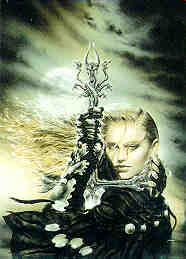 Elora
Deerhunter sat at a table all by herself. Seated in the Children of the
Night Tavern, she watched the antics of those around her. The place was
a sort of freak show for those that really had never found their place in
Jera. To mask this, they pretended to be what they were not.
Elora
Deerhunter sat at a table all by herself. Seated in the Children of the
Night Tavern, she watched the antics of those around her. The place was
a sort of freak show for those that really had never found their place in
Jera. To mask this, they pretended to be what they were not.
The place was supposed to cater to the goths, a group
of people as misguided as they were depressing, obsessed with death any
dabbling in drugs. Mostly they had just taken so much spice
that their brains had become miswired. After the opening of the Raven,
the new home for the losers, this place had begun to cater more to the
mainstream crowd. Elora often pondered where she fit in. Years of solitude
had left her empty inside. Examining what she lacked in her life, she
concluded that her denial of human contact could not last forever.
She sipped on a glass of Taberet, an elven wine of curious
vintage. In her mind's eye she journeyed back to her life in the eastlands.
She had traveled there in search of her elven roots. It all started when
a kindly elven man had returned to her village, half broken, but with
tales to tell. Elora had thrilled to hear of his travels. He wielded the
power of the wizard and the curiosity of a little boy. She hung on his
every word as he told of creatures of darkness and the foul orkish nations.
How he could live in such a place she could not understand. She came to
realize that he quested for knowledge as well. She had suspected that
all that the elven elders told was not true, but the implications of what
he came to tell her struck at her innocent mind in a profound way.
"Elora, I have told you of the lands to the east
and their foul inhabitants. I have spent my years chronicling what my
eyes have beheld. What I have never told you, and still dare not mention
to the elders, is that the history of this world is not what they have
said."
"One should not talk that way, Siriat. They will
find out."
Siriat rubbed his scant beard thoughtfully and sat down
on a stump. "They will find out one way or the other. Truth cannot be
bottled and saved. No cork can hold it in."
"Then tell me," urged Elora, leaning toward him,
"unveil your secret!"
"I fear that it will weigh down your young mind.
That is why I have not told you sooner. If you must know, I will tell
you, for soon I go to meet our fathers in the great unknown."
. Their construction is not of human build, nor of the
creatures of the east. The orkish and troll races build nothing of beauty.
They are stark and plain...functional."
"I always wondered what race besides the elves
could have made such wonderfully created buildings of stone and plant.
As I ventured closer to the capital of the foul empire, traveling in disguise
as one of them, I found that the building style of the remaining structures
from before whatever war destroyed the land became more and more elven.
I fought the thought that we could have ever inhabited such a land of
swamp and stench. Our elders teach that the eastlands have always been
so, that the creatures were of the handiwork of a since vanquished god.
Elora, such is not the case." The young woman's mouth slowly opened and
her eyes widened with disbelief. To doubt the wisdom, much less the truth
of an elder's sayings was blasphemous and punishable by law. Siriat smiled
at the innocence of the girl. He ran his gnarled fingers through her fine
blonde hair, his eyes piercing hers. "What I would do to reclaim the innocence
of youth. But such shall not return for me, nor for you, I fear." "When
I at last reached the city itself, it was not until I came to the base
of seven mountains capped with snow. The road to the orkish capital wound
through two of the smaller of them. There was a magnificent valley, a
lake in its center the color of ash. Buildings of elven architecture were
everywhere, but something immediately let me know that something was wrong.
The buildings had a sheen to them. Feeling them, I realized that the outsides
were glass, as if some intense heat had melted the very stone itself.
No plant would grow here. As I ventured into the edge of the city, my
worst fears played out themselves before me. There was a jade Life arch
that towered over the road, leaning slightly to one side. It had been
cleaned and the beauty of it was indescribable. I could feel the power
of it. As I approached, a voice whispered in my head, 'Welcome back to
Loyerya!' "
"My eyes frantically searched the city skyline,
and with horror recognized it for what it was, the elven city of song
and legend, lost to our people for centuries. If this was not strange
enough, then I saw an elven lady in the midst of the orcs, and they did
nothing to her. As she drew nearer, I felt the warmth and magic of her,
and turned my head. Still, I could not help but note the silver sheen
to her skin. She was one of the old ones!"
Siriat could barely contain himself, his eyes wide and
wild. He clutched Elora's hand with wrinkled hands. "My secret is now
with another. My soul can now rest."
He paused, then said, "There is one more thing...proof."
He pulled out a scarlet cloth wrapped around something hard and somewhat
bulky. He carefully unwrapped the cloth, treating it gently. As the cloth
fell away, it revealed a thing of beauty. A crystal egg some eight inches
high and six inches wide showed itself. Elora picked up the thing, which
weighed almost ten pounds. Images appeared and faded within it. Bright
lights and explosions rock a city within a ring of mountains like fire
from heaven. Elora cringed at the sight of people on fire and general
suffering everywhere. Then their eyes look upward and an intense light
emanated from the egg. A voice echoed in Elora's mind, saying simply,
"You left us behind."
Siriat died only a few days later, but he seemed at ease
with himself. Though almost his last words were never to go to the eastlands,
Elora could never let it rest. A week after Siriat's death, Elora arranged
an apprenticeship with a local magic user to learn the skills that she
would someday need to pass undetected in the eastlands. Her master put
her through an aggressive course of study, he himself a compulsive workaholic.
After four years in his service, she left to learn the secrets of the
east for herself. She kept careful journals as she traveled throughout
the land, including sketches of things she saw along the way. The journal
would come to be well known, the definitive source on the eastlands. Though
she kept her identity a secret, intending to publish the book under a
pen name, one thing that she saw no reason to hide was the truth about
the origins of the eastern nation. Over the next five years she would
discover many truths.
She befriended a family of Drow in the east, even divulging
to them her true nature. She found it hard to believe that the Drow felt
little of the hatred for the elves that they traditionally feel for them.
Though disguised with various illusions, she eventually the Drow community
discovered her true identity. When they learned that she was an elf from
the west seeking the truth about the eastlands, she was not only not killed
as she had feared, but given access to the town records, which chronicled
the departure of the elves and their eventual return some two hundred
years later.
Eventually she visited Loyerya, the former city of enlightenment.
The creatures inhabiting the town were not quite the horrible creatures
that she had expected. While some truly hideous creatures inhabit the
city, many of the orks and trolls resemble their human and elven ancestors
much more than the illustrations that she had seen back in Asterland.
She wrestled with whether the creatures were drawn as more hideous than
they actually are or if the creatures were truly becoming more human.
The Drow family that she stayed with verified that, in fact, the latter
was the case.
Sipping wine in the tavern, she ran her fingers over
the scaly hide that was the book cover of her writings. She had taken
the manuscript to two publishing houses so far, but the tales she told
were too fantastic for them to publish, much less believe. It seemed that
word had gotten around even by the time that she took it to the second
publisher, for she did not even get more than a few words out when she
was told, "thank you for your time," and was escorted out by an armed
guard. It was almost as if someone were trying to keep her writings from
seeing print. She told herself that she was just being paranoid, that
nobody really cared about her manuscript, and that was why it had not
been published.

